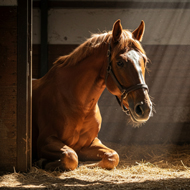First lab-made vaccine for Barber’s Pole worm developed
The vaccine trained the sheep's immune system to recognise the parasite.
Researchers have developed the first laboratory-made vaccine to protect livestock from Barber’s Pole worm.
The vaccine was produced using a new technique, utilising insect cells to replicate proteins normally found in the parasite.
Barber’s Pole worm is a gastrointestinal parasite, commonly found in sheep and goats. The worm attaches to the animal’s stomach to feed on its blood, resulting in severe anaemia, swelling and, in some cases, death.
The parasite is a significant contributor to livestock disease and economic loss for farmers worldwide.
However, parasite treatment and disease control are becoming more difficult to manage. The parasite has developed a resistance to many previously used treatments.
Prior to this study, the only available vaccine was developed by harvesting the worm from stomachs of slaughtered sheep. This was time-consuming, and also posed ethical issues.
Researchers from the Royal Veterinary College (RVC), in collaboration with the University of Veterinary Medicine and the University of Natural Resources and Life Sciences (both Vienna) have now produced the first lab-made vaccine to tackle Barber’s Pole worm.
For their first study, they developed a new technique, making use of insect cells which generate protective proteins which are normally found in the worm. The proteins then act as antigens, which can support the animal host’s immune response.
A second study then tested the efficacy of the new vaccine on potential host animals.
When given to sheep, the vaccine was found to train their immune system to recognise the parasite and create antibodies. It not only limited the ability of the parasite to establish in the sheep, but also reduced the amount of eggs shed by the parasite.
Researchers hope that their findings could lead to vaccines being produced with animals being slaughtered. The vaccine can also be produced faster, is more reliable, more humane and contributes to global efforts to manage livestock parasites.
It is also believed the new vaccine could reduce the use of chemical wormers, the efficacy of which has been impacted by growing drug resistance.
Dick Werling, professor of molecular immunology at the RVC, said: “This research shows that is indeed possible to create vaccines incorporating “foreign” sugars.
“This is an area my group has been working on for several years, and I am really pleased that we were asked to contribute with our knowledge to this ground-breaking work.”
The full study can be found in the journal npj Vaccines.
Image © Shutterstock



 Zoetis UK has called on horse owners to complete a short online survey about their horse's behaviours.
Zoetis UK has called on horse owners to complete a short online survey about their horse's behaviours.